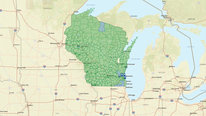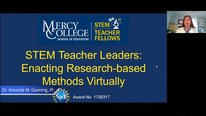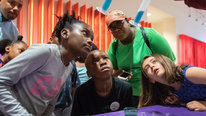- Lisa Lamb
- Professor
- Advancing Teacher Leadership in Urban Schools Through the Noyce Mathematics and Science Master Teaching Fellowship Program
- https://education.sdsu.edu/crmse/projects/noyce_main
- San Diego State University
- Talia LaTona-Tequida
- Graduate Student
- Advancing Teacher Leadership in Urban Schools Through the Noyce Mathematics and Science Master Teaching Fellowship Program
- https://education.sdsu.edu/crmse/projects/noyce_main
- San Diego State University, University of California San Diego
- Donna Ross
- Associate Professor
- Advancing Teacher Leadership in Urban Schools Through the Noyce Mathematics and Science Master Teaching Fellowship Program
- https://education.sdsu.edu/crmse/projects/noyce_main
- San Diego State University
- Meredith Vaughn
- Associate Professor
- Advancing Teacher Leadership in Urban Schools Through the Noyce Mathematics and Science Master Teaching Fellowship Program
- https://education.sdsu.edu/crmse/projects/noyce_main
- San Diego State University
Public Discussion
Continue the discussion of this presentation on the Multiplex. Go to Multiplex










Lisa Lamb
Professor
Welcome! We are delighted that you are visiting to learn about the ATLUS Noyce Master Teaching Fellowship Program (Award 1950335), led by faculty at San Diego State University. In August 2020, we selected 20 extraordinary Noyce Master Teaching Fellows (MTFs) from high-need urban districts in San Diego County. Our MTFs are working to improve the mathematics and science learning experiences of their students across demographic groups, and learning to lead their school-site mathematics and science colleagues as well.
MTFs will meet these goals by working with the National Center for Urban School Transformation (NCUST), with mathematics/science teacher leaders, earning an EdD in PK-12 Educational Leadership with a focus on mathematics and science leadership, apprenticing with university faculty in research labs, and engaging in apprenticeship in university courses for prospective mathematics and science teachers. They have a busy five years ahead of them. We are excited about the journey!
We would love to hear what wonderings and questions you have! Thank you again for visiting!
Catherine Horn
Meredith Vaughn
Larry Sowder
This project sounds really good! Building on the expertise of practicing teachers is an excellent plan, for all teachers, not just those working with urban schools. I look forward to hearing more about the project's progress.
Lisa Lamb
Catherine Horn
Lisa Lamb
Professor
Larry, Thank you! Although we are in our first year, our Master Teaching Fellows have had many experiences. This summer, they will engage in research labs at SDSU, and the MTFs are excited about this next experience!
Anne Papakonstantinou
This is an ambitious plan. Kudos for the high expectations for your Fellows!
Catherine Horn
Lisa Lamb
Donna Ross
Associate Professor
Thanks Anne,
Our partnerships really allow us to offer many opportunities to our Fellows. -Donna
Catherine Horn
Lisa Lamb
Katie Schenkel
It is so exciting to see this project in action! Way to support excellent STEM education through the formation of professional and passionate teacher leaders!
Catherine Horn
Meredith Vaughn
Lisa Lamb
Lisa Lamb
Professor
Thanks, Katie! We are excited about the opportunity to spend 4 more years with them! They are an incredible group!
Anne Papakonstantinou
Absolutely, mentoring and supporting novice and struggling teachers as well as catalyzing colleagues are important roles that teacher leaders can do.
Catherine Horn
Lisa Lamb
Lisa Lamb
Professor
Agreed! Learning how to support colleagues can be tricky, and so we are grateful to the National Center for Urban School Transformation for supporting the work.
Christine Royce
Professor
Hi Lisa and Team,
It sounds as if the partnership with the National Center for Urban School Transformation is a valuable part of the program. When designing the program and collaborating with the center, what were some of the needs that you identified within your program that the center helped to meet in your local area? Additionally, I was interested that the narrative above indicated that the fellow is elementary math and science - have you seen a major difference between working with future elementary teachers and secondary teachers within the program?
Lisa Lamb
Catherine Horn
Meredith Vaughn
Associate Professor
Yes, the National Center for Urban School Transformation has been a valuable partner in the work! Our project is a Noyce Fellow (rather than scholars) so these teachers were selected as having some expertise and significant experience in the classroom which allows for interesting conversations across the K-12 trajectory. I suspect it would be different (and more difficult) if they were preservice teachers!
Lisa Lamb
Catherine Horn
Christine Royce
Professor
Thank you for clarifying the fellows versus scholars aspect -- that makes much more sense as you describe the difference.
Lisa Lamb
Lisa Lamb
Professor
I agree with Meredith's comment that the expertise of all of the Master Teaching Fellows has likely influenced the kinds of participation and discussion among the MTFs. Because our Fellows recognize the strengths and contributions of one another, the differing grade levels of the teachers has not been as prominent an issue as we might have expected. If these were novice teachers, I agree that we would have to think differently about the different grade levels. Great question. Thank you!
Anne Papakonstantinou
In our program, the elementary teachers loved the high school perspective that the Noyce fellows brought. They felt they better understood their roles in the development of content strands. They also understood the importance of consistent math language in K-12.
Lisa Lamb
Catherine Horn
Meredith Vaughn
Associate Professor
Yes!! It makes for some really interesting conversations that might not happen if we did not have teachers working across the grade spans!
Lisa Lamb
Catherine Horn
Catherine Horn
Moores Professor and Chair
Thanks, San Diego State, for your important work to develop teacher leaders. I would love to hear more specifically how your project operationalizes "leadership" and one or two examples of ways that you are intentionally developing that aspect of teacher capacity. I would also love to know more about what you all have (or would imagine) as outcomes 3-5 years past completion of the project that would indicate leadership success.
Appreciate your work!
cathy
Lisa Lamb
Caroline Ebby
Caroline Ebby
I am also interested to hear more about this--how you are defining and supporting leadership capacity.
Lisa Lamb
Donna Ross
Associate Professor
Hi Catherine and Caroline,
Thank you so much for your interest in our project. We strive to define leadership broadly. Although some of our Fellows may move into administration, we hope to retain many of them in the classrooms to serve the needs of our local children. To that aim, we provide as many opportunities as possible for them to consider how to be leaders while still teaching. The list is too long to include everything, but here are a few of the opportunities which include shadowing an educational leader for 45 hours to identify effective leadership traits, analyzing the components of effective PD, developing and presenting professional development workshops, mentoring new teachers, leading PLCs at their own sites, networking with other educators across the state, sharing current research with fellow teachers, etc... They are already doing amazing things!
Lisa Lamb
Lance Bush
This is such critical work and so glad to see your progress on it. Some others touched on grade level lessons, and I am wondering as well about any specifics learned at the upper elementary school level since it is a critical time to keep them engaged in math and science, as they head toward middle school.
Lisa Lamb
Lisa Lamb
Professor
Lance, great question! We are fortunate to begin our work with experienced and effective K-12 teachers of mathematics and science, and so although our Master Teaching Fellows are always focused on improving their own practice, our project is designed to prepare them to support their colleagues, especially at their school site. For this kind of work, our work with NCUST (and their related research (see Johnson, Uline, and Perez, 2017 and 2019) has grounded the support provided, by providing lenses for school-wide improvement.
Jill Berg
Leadership Coach, School Improvement Consultant & Author
It's exciting to see the expertise of educators elevated in strategic ways. There is a lot of research specifically on STEM teacher leaders, including this linked BSCS report from 2017 and EDC's Knowledge Management & Dissemination project from 2010. I wonder if you can tell us about ways research on STEM teacher leadership has influenced and informed your work, and perhaps even how your project might promise to extend this knowledge base.
Best,
Jill
Lisa Lamb
Lisa Lamb
Professor
Hi Jill, Thanks for your question! Our collaboration with the National Center for Urban School Transformation (and its related research, see Johnson, Uline, and Perez, 2017 and 2019) has grounded the support we have provided, by providing lenses for school-wide improvement. In addition, our external evaluators, West Ed, have provided STEM leadership instruments that we are using to help us gauge our success and improve our support for our MTFs. We are also finding that work on Professional Noticing of Students' Content-Specific Ideas (e.g., Jacobs, Lamb & Phillip, 2010; LaRochelle, Nickerson, Lamb, Hawthorne, Philipp, & Ross, D.L., 2019) supports STEM leaders to support their teachers, because professional noticing is grounded in STEM teachers' classroom practices. We are hopeful that the integration of the research from NCUST and our focus on STEM practices will extend the knowledge base around STEM leadership. Thank you again for your comment!
Jill Berg
Doan Phan
Special thanks to Dr. Lisa Lamb, Dr. Randy Philipp, and other influential math-science education professors for your leadership in this project. Grateful for the partnership of NCUST and a generous grant from the NSF! Can't wait for the lab experience this summer and four more years of learning. SDSU all the way!!!
Lisa Lamb
Meredith Vaughn
Lisa Lamb
Professor
Stephen, we are delighted that you were willing to share your experiences about your work in the Noyce Master Teaching Fellowship with the community! Looking forward to learning alongside you!
Caroline Ebby
Thank you for sharing your work on this project. I am wondering if all of your fellows working to become math and science leaders across grade levels K-12? Or are some focusing on specific subjects or grade bands (K-5 math leaders, for example?) Also, are the fellows full time classroom teachers, or have they already been designated as math/science leaders for their schools?
Lisa Lamb
Meredith Vaughn
Associate Professor
While they are all working and learning together, the fellows each applied to the program with a focus on math or science and are expected to focus on their particular grade band (so middle school science, for example). All of the fellows are full-time classroom teachers. Some fellows hold additional leadership responsibilities such as leading a department or professional learning community.
Lisa Lamb
Jonee Wilson
Thank you for sharing this important work! It's great that the program incorporates identifying and studying exemplary schools/teachers as well as developing a cohort and community of support. How do you frame the visits/walkthroughs with the successful schools in ways that support the fellows in focusing on specific aspects of instruction? I find, especially with preservice teachers, that conversations following on-site visits, observations, or even classroom instructional video viewing are most productive when we have taken the time to develop a shared lens beforehand.
Lisa Lamb
Lisa Lamb
Professor
Hi Jonee, Many thanks for your question! We agree that we need to have a shared lens beforehand, and we have really appreciated the focus from the National Center for Urban School Transformation (NCUST) on helping our Master Teaching Fellows to understand eight teaching (and related leadership) practices that they found especially support students' learning. Before visiting classrooms, NCUST leaders engage teachers in professional learning by discussing those practices from Johnson, Uline, & Perez (2017 & 2019) in Teaching Practices from America's Best Urban Schools, and Leadership in America's Best Urban Schools. Then, during visits, they hone in just one or two of the practices, and use the visits to identify what the practices are as well as what they are not. We are fortunate, too, that in this project we are working with committed, experienced, and effective teachers of mathematics and science, so our starting point is different than it is when we work with our preservice teachers. Thank you again for the question and for your sharing!
Sonia Duffau
Wow, this is an amazing project, and such a wonderful testimony, are you making a library of material for teaching from the experiences you develop with the fellows? That would be an amazing resource to have and to share!
Lisa Lamb
Lisa Lamb
Professor
Sonia, Thank you so much! Great idea to consider a library of material and how we might share with others. We will make that a topic of one of our next leadership meetings. Thank you for the suggestion!
Sonia Duffau
Yay! :)))
Lisa Lamb
Judy Sowder
Lisa, you are all doing an outstanding job! Thanks for all your work on this important project.
Lisa Lamb
Lisa Lamb
Professor
Judy, Thank you! We have great partners and wonderful teachers who are taking part.